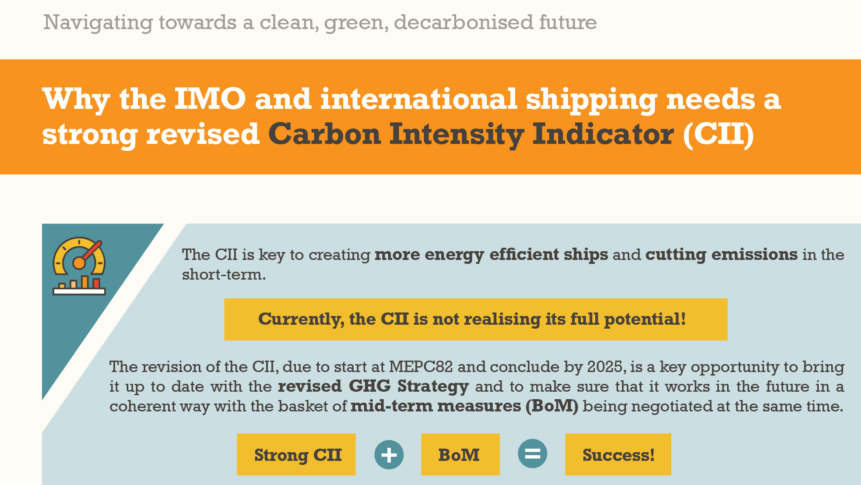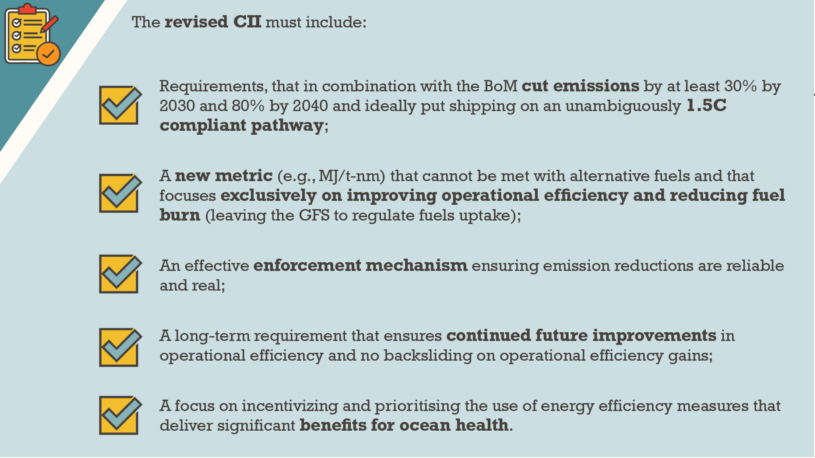Success of UN shipping climate action in the balance as necessary 2030 and 2040 targets remain unclear

24 March 2023 – Countries must keep the pressure on the UN to commit to reducing emissions from global shipping before 2030, in the run up to a crucial climate summit at the International Maritime Organization (IMO) in July. This is the only way shipping can achieve the UN’s own goal of limiting global temperature rise to 1.5°C.
At the latest round of talks (ISWG-GHG-14) on 20-24 March, a growing number of IMO member states (45) agreed shipping must reach zero-emissions by 2050. Support also grew for additional goals for 2030 (37 countries) and 2040 (43 countries) that would help move ship emissions towards a 1.5°C trajectory. 13 countries persist in opposing any increase in the IMO’s climate ambition.1
The recent IPCC Synthesis Report warns that limiting climate change to 1.5°C requires deep and immediate emission reduction across all sectors within this decade. Climate change is already causing damage to nature and people, and urgent action now is the only way for humanity to limit this and ensure a livable future.
IMO member states must listen to the IPCC, and urgently commit to halve greenhouse gas emissions from ships by 2030 and to reach zero-emission by 2040. It must also ensure that this transition is just and equitable, given the disproportionate impacts on vulnerable states.
Countries and the industry have all the tools they need to deliver shipping’s 1.5°C-aligned transition. Measures such as improving the energy and operational efficiency of vessels, slow-steaming, electrification, and wind-assisted propulsion can cut emissions by a third already today.
A greenhouse gas levy of at least $100/tonne of greenhouse gas, combined with a fuel greenhouse gas standard that drives increasing emission reductions over time, adopted by the IMO would generate billions of dollars to fund the development of zero-emission technologies and to assist the most vulnerable countries with addressing the impacts of climate change.
John Maggs, Clean Shipping Coalition, said: “The IMO’s initial greenhouse gas strategy in 2018 seriously missed the mark and led to five wasted years of shipping climate inaction. History must not be allowed to repeat itself. Aiming only to reach zero by 2050 will not put shipping on a 1.5°C pathway. High ambition countries, such as the US, Canada, the UK, Pacific states and the EU, must use the remaining time to push against the blockers and insist that the final agreement contains the necessary commitment to halve ship emissions before 2030. Without this the IMO will have failed again.”
Faig Abbasov, Transport & Environment, said: ”One cannot legitimately claim to have a 1.5ºC compatible strategy if it doesn’t include clear and deep emissions reduction in this decade. This means at least 37% to 50% emissions cuts by 2030. Europe has a moral responsibility to stand with the climate vulnerable nations and espouse science-based decarbonisation pathway for shipping. Zero-by-2050 alone is no longer enough!”
Delaine McCullough, Ocean Conservancy, said: “Developing countries, especially the least developed and small island states, face disproportionate risks from climate breakdown both because of their geographic location and their limited resources to respond to climate-driven weather events. These factors also make it more likely that they will face higher costs from the transition to zero-emission shipping and challenges to fully participating in it. Having done little to cause the climate crisis, these nations and their people cannot wait 30 years for shipping to cut emissions—the IMO must ensure an equitable transition by setting Paris-aligned targets that cut greenhouse gas emissions by 50% by 2030 and 100% by 2040.”
Jim Gamble, Pacific Environment, said: “The science is clear: we have no time to waste to secure a livable, sustainable future for all. This means that ocean shipping must step up on its ambitions to halve emissions by 2030 and move to 100% zero-emissions by 2040. While the shipping industry moves goods on polluting ships across the globe at a profit, vulnerable nations bear the cost. It’s time to turn the ship around and move the shipping industry off of fossil fuels once and for all.”
Lucy Gilliam, Seas At Risk, said: “The IMO needs to get its ship together. The IPCC clearly warns us that halving emissions by 2030 is necessary for climate safety. We are dangerously close to tipping points of no return, if we do not bring emissions down fast. You wouldn’t plan a voyage without setting clear waymarkers to guide your course? Why do IMO delegates think we can reach our destination if we don’t set out a clear course to reach it?”
Background information:
The IMO is in the process of revising its existing climate targets, which currently aim to only halve emissions from ships by 2050. The negotiations are set to continue on 26-30 June (ISWG-GHG-15), before concluding on 3-7 July (MEPC 80).
1 See ‘An overview of the discussions from IMO ISWG-GHG 14‘ from UMAS and UCL
This press release is issued by:
- John Maggs, Clean Shipping Coalition: jmaggs@seas-at-risk.org
- Delaine McCullough, Ocean Conservancy: dmccullough@oceanconservancy.org
- Lucy Gilliam, Seas At Risk: lgilliam@seas-at-risk.org
- Jim Gamble, Pacific Environment: jgamble@pacificenvironment.org
- Daniele Rao, Carbon Market Watch: daniele.rao@carbonmarketwatch.org
- Faig Abbasov: Transport & Environment: faig.abbasov@transportenvironment.org


